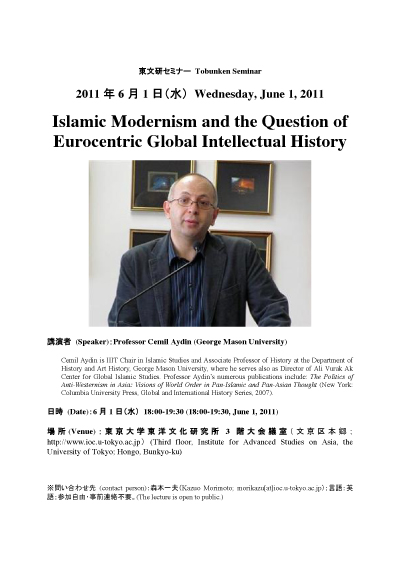
|
Title: | [Related Events] Tobunken Seminar: Lecture by Professor Cemil AydinFinished |
||
|---|---|---|---|---|
| Date: | 18:00-19:30, Wednesday, June 1, 2011 |
Place: | 3rd floor, Institute for Advanced Studies on Asia, University of Tokyo, Hongo [Map] |
|
Tobunken Seminar: Lecture by Professor Cemil Aydin
Islamic Modernism and the Question of Eurocentric Global Intellectual History
Speaker: Professor Cemil Aydin (George Mason University)
Cemil Aydin is IIIT Chair in Islamic Studies and Associate Professor of History at the Department of History and Art History, George Mason University, where he also serves as Director of Ali Vurak Ak Center for Global Islamic Studies. Professor Aydin’s numerous publications include: The Politics of Anti-Westernism in Asia: Visions of World Order in Pan-Islamic and Pan-Asian Thought (New York: Columbia University Press, Global and International History Series, 2007).
Language: English
The lecture is open to public.
Contact: Kazuo Morimoto (E-mail: morikazu[at]ioc.u-tokyo.ac.jp)
Abstract:
In the scholarly writings on the global intellectual history of the last two hundred years, we see special attention given to the emergence of universal and global values, such as the ideas of national liberty, equality, international law and human rights. Once we assume the existence of global and universal norms, we have the inevitable question of the origins of these global values, which, most of the time, takes us to the debate on Eurocentrism. We end up tracing almost all of the assumed universal values and ideas back to European intellectual history. According to the main narratives of modern non-Western intellectuals, nationalist or reformers still reproduce this Eurocentrism because they show a kind of non-European seizure of European universalism, in some sense, a subaltern fulfillment of the Eurocentric values that led the way to a kind of anti-colonial internationalism, and associated norms such as national self-determination, racial equality, and freedom from colonial rule. Thus, Ataturk, Sun Yat-Sen, and even Gandhi would become avatars of Eurocentrism in history of global norms, although it was their agency and ideas which shaped modern international history.
While this narrative is giving primacy of historical agency to subaltern and non-Western figures in realizing and actualizing the universal potential of Enlightened European values, it seems all of these values still originated from the small geographical area of Western Europe. Moreover, the globalization of universalistic ideas becomes very abstract and teleological: There is not sufficient attention given to the ideas that are modern, globalized but not originating from Europe, while differences in the globalization of European ideas in different parts of the world are not well explained. Even though intellectuals in Muslim majority societies, Confucian East Asia, or Buddhist South East Asia were all exposed to a similar set of globally circulating ideas, there were crucial differences in their main formulations and in dominant trends. We should see the similarities among Tagore, Okakura Tenshin, Ahmed Riza, or Muhammad Abduh and W.E.B. Du Bois, but differences are also important to underline.
This paper will discuss the globalization of Islamic modernism and its associated values to revisit the question of Eurocenrism in global intellectual history. Why was Islamic modernism as well as the admiration for Ottoman Empire and its Caliphate was so dominant in Muslim societies between 1870s to the 1930s, an era retrospectively described as the high period of rising nationalism and Europeanization of the world? What can we learn from the modernist hermeneutic engagement with early Islamic texts with regard to questions of global intellectual history?







